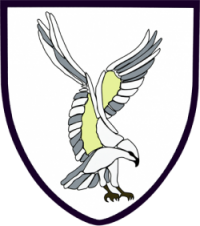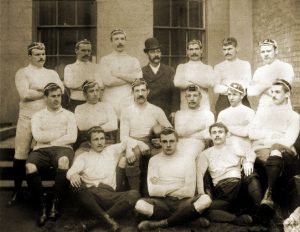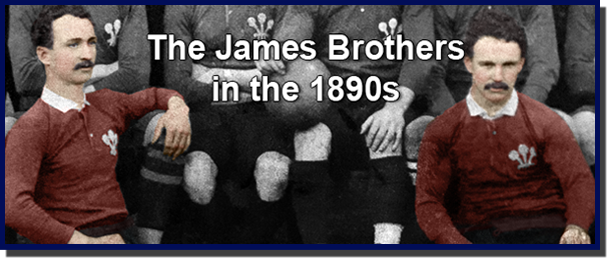
The following article has been submitted by Josh Packman, studying at Swansea university:
The story of Evan and David James tells us a lot about rugby and Swansea during the nineteenth century, the Swansea born brothers’ careers were told through various newspaper articles from the time and have been written about by rugby historians to this day for their contribution to the game and the controversy surrounding their career. This article will look at the careers of the James brothers and use their story to understand the difference between rugby in the nineteenth century and now, while also looking at the state of Swansea during the nineteenth century. Using primarily newspaper articles from Swansea, we can look at the careers of the brothers and look at how their careers relate to the broader context of rugby and Swansea in general.
David and Evan James were both born in Swansea, David in 1866 and Evan in 1869; they had three younger brothers, Claude, Sam and Willie, the latter two playing at the same level as David and Evan towards the end of their careers. The brothers worked at the copper smelting factory in St. Thomas coming from a working-class background, St. Thomas was one of seven copperworks located in Swansea which gave Swansea the nickname ‘Copperopolis’ during the nineteenth century.[1] The brothers were among the thousands of men and women who were employed into the copper industry with Swansea being responsible for exporting 90% of British Copper ore, which would be transported all over the world to countries as far as Cuba.[2] The brothers were working in the copper industry at a time when it began to decline in Swansea with alternative copperworks being built in places such as America, but this did not mean that Swansea was still not crucial to British trade and this was apparent with the degree of development to the dock still visible to this day.
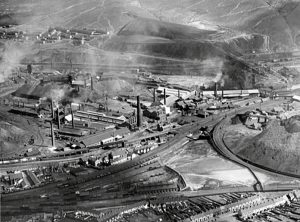 |
| Hafod and Lower Valley Copperworks, Swansea in the late 1920s, soon after copper smelting had come to an end. |
In 1882 we see the last of Swansea’s dock developments which saw the overcrowded Swansea docks get an expansion in the form of the Prince of Wales dock as other metallurgy industries such as tin, iron works and brass smelters were also prominent in Swansea. The nineteenth century saw a boom in Swansea’s population which meant that people were emigrating from across Britain to find work in the various metal industries, which in turn meant that their children would be brought up in a harsh physical environment that was well suited to rugby.[3] In 1841 there were a total of 24,604 people living in Swansea but by 1871 not long after the birth of Evan and David that number had risen to a staggering 51,702, over twice the number of people living in Swansea compared to thirty years prior.[4]
David and Evan debuted for Swansea RFC during the 1889-1890 season with Evan making his international debut in the same year in a loss against Scotland. The brothers quickly became firm favourites amongst the Swansea crowd for their style of play which looking back, was years ahead of their time with rugby being a very different game to that which we know today. The brothers played during a time where the four, three-quarter system had only recently been introduced. By 1886 most Welsh teams played the four three-quarter system with the James brothers innovating the halfback position. As the four three quarter system developed, it became the role of the halfback to distribute the ball as quickly as possible to the players behind them.[5] The James brothers were pioneers of the halfback position as they would often pick the ball up and instead of passing it across the back line would create gaps by inter-passing between themselves creating a situation which the opposition’s defence would have struggled to prepare for. It can be argued that the Swansea team’s success was partially dependant on the brother’s style of play since it was so unique and no other set of halfbacks did what they could do. Nicknamed ‘The curly haired marmosets’ the brothers captivated the working class audience with their flair and natural ability, with The Cambrian referring to the brothers as “tricky and resourceful” in only their second season playing for the club.[6] The brothers were referred to in his 1892 book on rugby by Reverend Frank Marshall, who was instrumental in the harsh prosecution of players for professionalism as the best pair of half backs in Wales. This is because they made daring tackles despite their size and had a unique style that involved David passing low and fast from the scrum to Evan who had great hands, their ability to dodge tackles and quick interpassing made them extremely difficult to stop once they were clear of the forwards.[7] The pioneering of the half back role of the James brothers was their legacy at Swansea with their successors Dickie Owen and Dick Jones further developing the role the brothers had innovated.
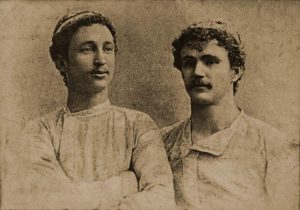 |
| David and Evan James Circa 1896, Photograph courtesy of Swansea RFC
|
|
|
| Swansea Football Team First Fifteen, 1889-1890, Evan and David can be seen in the front row at the start of their amateur careers, image courtesy of Swansea RFC |
The controversy of the James brothers began in April 1892 when the brothers left Swansea for a brief period to play at West Hartlepool. Due to laws surrounding professionalism, the brothers could not get paid to play in Swansea, therefore, had to carry on working in the copper mill. During the move the local press was angry at the fact they felt abandoned by the James brothers and could not work out why they were leaving, claiming they had their pockets lined with gold after the international game against Scotland.[8] Although we cannot be sure as to the reason the brothers left to play for Hartlepool, it would not be wild to speculate they were looking for a better life after one article claims they were mistreated by Swansea RFC in times of illness and that they had the opportunity to find work elsewhere which may have been more beneficial for their health compared to working in the copper factories.[9] We have an idea of why the brothers returned so soon after leaving thanks to Mrs Preece, the granddaughter of David James, who was generous enough to allow me to interview her regarding David. In the interview Mrs Preece claimed that the family did not enjoy living up North due to the difference in culture and language, coming from a primarily Welsh-speaking family, her grandmother did not tolerate people who made fun of their accents and was very much against staying up North.[10] The brothers returned to Swansea the following week after not finding employment and, threatened with suspension by the Welsh Football Union (WFU) due to rumours of payments made. They were welcomed back with open arms by the town and by the club with hopes they would be able to play the following season again.[11] Shortly after the start of the 1892-93 season the brothers moved north once again, but this time the reasons were clear. The brothers demanded a wage of 30 shillings per game for playing at Swansea RFC which at the time was illegal in the laws of the WFU, so naturally, the club refused. Professionalism was illegal everywhere until 1895 when the Northern Union split from the RFU to allow payment to players.[12]
The brothers were sought out by Manchester-based club Broughton Rangers who would offer to pay the brothers secretly, a problem that the RFU had with Northern clubs for some time until the spit of the Northern Union in 1895. The brothers were also offered regular employment in Manchester by the Rangers.[13] The move was met with great interest from the people of both Lancashire and Swansea, and an enquiry was held to determine the legality of the brothers’ move without a proper transfer from Swansea RFC. The first meeting was held on the 18th October 1892 where both the brothers and the Rangers presented evidence to support their move, the hotel in which the meeting took place was surrounded by Rangers fans which illuminates the popularity of the brothers in England as well as Wales.[14] A second meeting was held on the Saturday of the same week and saw contradictory statements given from Swansea RFC and the James brothers which meant that due to insufficient evidence the brothers were not granted their transfer and suspended from playing rugby by the WFU.[15]
The denial of the brother’s transfer and their suspension was another marker in the debate of professionalism in rugby. Though outwardly all clubs complied with this rule, players often received payments in secret which was illegal by RFU rules. Northern English clubs would try to keep players with secret payments, but it was hard for them to hide this. Debates of professionalism would see the Northern Union form in 1895, freed from the constraints of the RFU, allowed players to receive payment for playing under certain conditions.[16] Northern League players were then allowed a maximum of six shillings per day, but no payments could be made during the offseason nor could any paid player serve on the committee.[17]
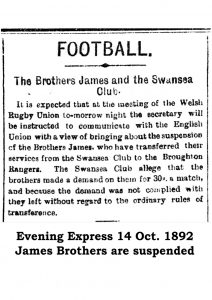 |
| News Article confirming the suspension of the James Brothers by the Welsh Football Union. ‘The Brothers James and the Swansea Club’. |
In Wales, rugby was purely an amateur sport, much like it was in the rest of England as the elite wanted to keep it as a gentleman’s game and believed that holding payment from players would mean that only those who could afford to spend time playing rugby would do so .[18] The RFU laws on professionalism stated that any money or employment received as a direct outcome of playing rugby or for expenses travelling to play rugby where illegal, another rule regarding professionalism stated that refusing to aid any investigation much like the James brothers did was also a part of professionalism.[19]
For many Welsh players moving North, claims of professionalism were met with the defence that they were moving because of work. The James Brothers claimed that they were also moving for work, the Broughton secretary said that one of them had been out of work for a while and the other was working, but trade was bad in Swansea, so they decided to move North.[20] The move North was not exclusive to the James brothers, whose names were added to a long list of Welsh talent with players such as D.H. ‘Harry’ Bowen who had been poached by a Northern club that was able to offer money to the best players from Wales despite constant disagreement with the RFU. Links between Northern and Welsh clubs had been made in the 1880s with one of the first Welsh players leaving to play up North being Harry Bowen of Llanelli who signed briefly for Dewsbury in February 1884.[21] The move of the James brothers was met with complete disdain by the local Welsh media who claimed that the Northern clubs had to steal players since they could not breed their own talent.[22]
The brother’s suspension from playing rugby saw the next few years become a very lean period for Wales on the international scene. The brothers returned to Swansea in 1893, the year in which Wales won their first Triple Crown and Home Championship. The Welsh win ought to have signalled the golden era of Welsh rugby, but that would not come until the end of the decade. If the brothers had been able to play, it is arguable that this golden era would have arrived sooner.[23] The most notable of Wales’ wins in the 1893 Home Championship was the 12-11 win against England in which Swansea’s own Billy Bancroft scored the winning penalty in the dying moments of the game; Wales would go on to beat Scotland 9-0 and Ireland 2-0. The following years saw a slump in international results with Wales not hitting good form until the return of the James brothers in 1899 in which Wales would once again defeat England, this time at Swansea with a more convincing scoreline of 26-3.[24]
The brothers had been banned since October 1892, and during this period they returned to work at the Hafod copper smelting house owned by the Vivian family.[25] Despite conditions being better than at the start of the century, working for long hours in the copper smelting factory was terrible for the worker’s health. Evan James was a victim of these conditions, and his early death was caused by the dirty air of the factory. The copper industry was also on a decline at this period with more copper smelters being built abroad, especially in America, which negated the need for ships to travel from Cuba to Swansea.[26]
Following a long three-year spell in which the brothers could not play, they were finally reinstated on the 31st January 1896 which saw a fabulous spectacle as people from all over Swansea gathered at John S Brown’s Ironmongers. Brown allowed the use of his flashlights to telegraph whether the brothers would be reinstated or not, as everyone waited for a telegraph from Leeds concerning the decision.[27] There were three possibilities as to what would happen with the decision. The first possibility was that the brothers would not be reinstated which would have been signalled by a stationary light from the spotlight. The next possibility was that more time was needed to make the decision, and therefore, the case would be adjourned to a later date. Two stationary lights would signal this outcome. The final possibility was that the brothers would be reinstated and could, therefore, play against Cardiff the next day. This happy result was announced as one spotlight revolved in the sky and could be seen from Bridgend to Carmarthenshire.[28] Congratulations were received from Llanelli as the return of the brothers was a good thing not just for Swansea but for all of Welsh rugby. The brothers themselves told the South Wales Daily Post how they watched the light from their house on Kilvey Hill along with the rest of their street and that they were eager to play against Cardiff the following day.[29]
The following day saw the biggest game of the season with an almost record attendance to watch the return of the James brothers, Evan scored in the first half, but unfortunately, Cardiff mounted a comeback in the second half to win, with Swansea missing quite a few chances. Being away from the game for so long meant that the brothers were not as sharp as they once were and needed time to get back into the routine of playing. But thney were soon back in their stride and also were selected to play for Glamorganshire against touring Yorkshire team in 1896, evidence that they were now fully back in the fold.[30]
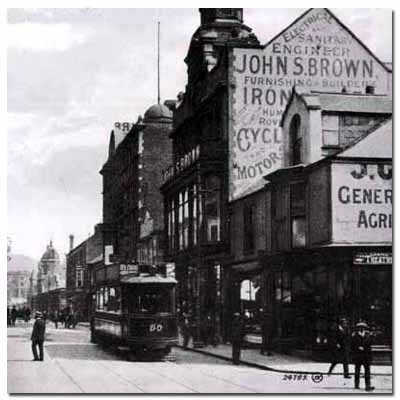 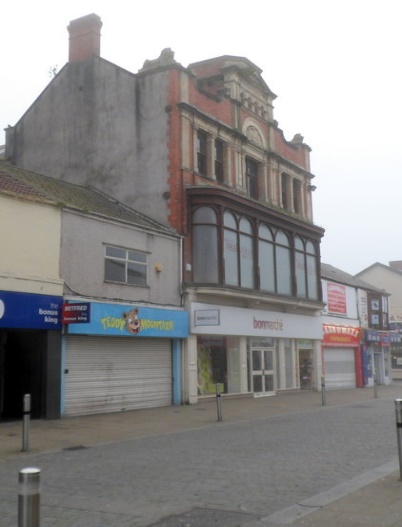 |
| John S Brown Ironmongers sign is still visible in Swansea city centre today at 21 Oxford Street.
|
As the brothers continued their career with Swansea, so did their younger brother, Sam James who debuted for Swansea in 1898 as he partnered his brother David as a halfback in a game against Leicester. Swansea won comfortably with a large crowd attending to see if Sam was as good as Evan, in fact, he almost was, he played the same sort of game as Evan just without the experience that Evan possessed.[31]
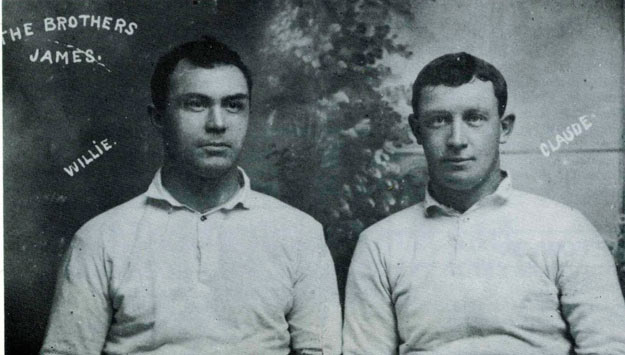 |
| Willie and Claude James, the youngest of the James brothers. |
Sam would continue playing rugby with David and Evan in Swansea up until 1899 when the brothers received another offer to go and play for Broughton Rangers once again, an offer they accepted due to the uncertainty of employment with the decline of the copper industry in Swansea.[32] The Rangers made an offer to the brothers and their entire family, paying the brothers a £200 signing fee as well as £2 a week each to play. When asked about the offer, Evan stated how the lack of work at Hafod copper works was the main reason they were actively considering accepting the offer.[33] The extended James family – all sixteen of them – moved north just days after David and Evan had shone at St Helen’s in a stunning 26 – 3 win over England. It was their first appearance for Wales since 1892 and was to be their last. The Broughton Rangers offer sparked a debate in the local press regarding amateurism in Wales with the club powerless to stop the brothers moving as they were not allowed to pay the players per WRU laws. Northern clubs who had renounced their RFU membership in 1895 and formed the Northern Union with more relaxed regulations could offer players a ‘broken time’ payment for loss of wages while playing rugby for their club, with the RFU and WFU powerless to intervene.[34] The reason for the split from the RFU was due to the conflict in interests regarding professionalism with many Northern clubs representing the working class and believing they should be able to pay their players whereas the London based clubs saw rugby as a hobby that if one cannot afford to play rugby, then he should go without. Anger in Wales was not directed at the brothers but at the Northern clubs who continually poached the talent of amateur clubs, allowing them to make a living playing rugby as opposed to just playing for sheer enjoyment.[35] The brothers would accept the offer which allowed four of the five brothers including Sam and Willie but not Claude who was only thirteen to play for the Rangers.[36] Broughton Rangers even arranged for one of the best doctors in Manchester to see to Evans injury to get him playing as soon as possible and thus the brothers went North once more.[37]

Cartoon depicting the brothers leaving Swansea for Broughton with a smile on their face. ‘The Brothers James Return to Broughton’, South Wales Daily Post, 26 January 1899, p.3
The loss of the James brothers jeopardised what was looking to be an undefeated season for Swansea, but there was still hope that they would return in a few weeks and they were even selected for the next Swansea match in their absence[38] The brothers played in Broughton up until Evans death in 1901, with Evan suffering from injuries on and off until his death. He did still play however and on return from injury in October 1900, played well against Barrow, coming inches away from scoring before being stopped by a defender.[39] Evan retired at the beginning of 1901 due to illness which had been a result of working in the copperworks for so long; his retirement saw an exclusive 12 vs 12 testimonial match played between 12 English and 12 Welsh players with Evans’ younger brother Willie playing.[40] Despite the poor attendance, a cheque for £2 14s and 6d was put forward to the Evan James testimonial fund by T. Broadley captain of the Bradford team with the total money received for the fund coming to around £100 to try and help Evan who at this point had returned to Swansea with his health declining rapidly.[41] In the pursuit of better health Evan travelled to Ventnor on the Isle of Wight but found no improvement so returned to Swansea along with his brother David while both other brothers, Sam and Willie stayed up north.[42] Evan died from consumption at Bonymaen, Llansamlet, Swansea On Saturday 17th August 1901, due to the working conditions in the copper factories and ignorance or intransigence of the links with consumption. Newspapers blamed a cold Evan caught when he was playing up North that developed into consumption.[43] David would not play in the international games in the next decade which saw the Welsh golden era begin in which Wales won four championships in ten years and consecutive grand slams in 1908/09.[44] In the years following Evans’ death, David returned to Swansea according to his granddaughter. In the interview, Mrs Preece told me how David returned and built a house with the money the brothers had received from playing in Manchester. David did not go to watch the rugby games anymore, instead preferring to watch the football so he would not be recognised and people would not talk to him, as was the shy demeanour that David had off the field, a complete contrast to his personality on the field with Evan.[45] David would pass away on January 2nd 1929 leaving a legacy behind in which he and his brother proved they were ahead of their time with their style of play. Newspapers confirming his death eulogised about how skilful the brothers were.[46]
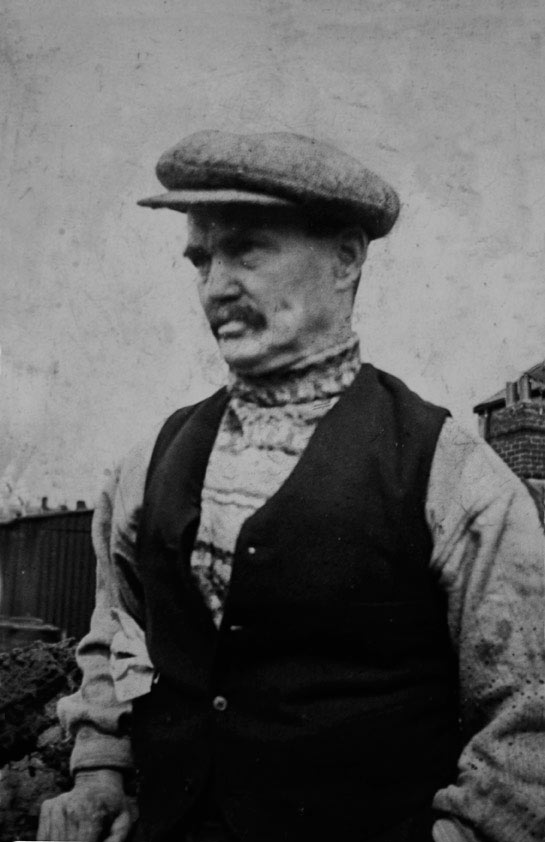 |
| David James towards the end of his life after moving back home to Swansea after the death of Evan. |
The story of the James brothers tells us a lot about the state of rugby and the state of Swansea’s industry in the late nineteenth century. Their legacy is remembered today in Swansea RFC’s clubhouse, and they will always be viewed as pioneers of the game by those fortunate enough to know their story.
[1] Derek Draisey ‘Swansea & Gower in Victorian and Edwardian Times’ (Swansea: Draisey Publishing, 2011), p.201
[2] Paul R. Reynolds, ‘Industrial Development’, in Swansea: An Illustrated History, ed. by Glanmor Willaims (Swansea: Christopher Davies Publishers, 1990), 29-56 (p.32)
[3] Gwyn Prescott, ‘this rugby spellbound people’ The Birth of Rugby in Cardiff and Wales (Cardiff: St David’s Press, 2015), p.11
[4] Draisey, p.259
[5] Ibid
[6] ‘The Crack Welsh halves’, The Cambrian, 10 April 1891
[7] Reverend Frank Marshall, Football, The Rugby Union Game (London: Cassell & Company Limited, 1892), p.257
[8] ‘Swansea Football, Departure of “The Jameses”’, The Cambrian, 23 April 1892, p.3
[9] Argus, ‘Football and General Athletic Notes’, The Cambrian, 29 April 1892, p.6
[10] Eira Preece, David James Interview, 8 May, 2019
[11] Argus, ‘The Bros James Coming Back to Swansea’, The Cambrian, 29 April 1892, p.5
[12] ‘The Brothers James and the Swansea Club’, Evening Express, 14 October 1892, p.3
[13] Ibid, p.3
[14] ‘Football Notes’, The Cambrian, 21 October 1892, p.8
[15] ‘The Brothers James, Lancashire refuses their transfer’, South Wales Daily News, 24 October 1892, p.6
[16] Collins, p.132
[17] Ibid, p.132
[18] Robinson, p.321
[19] Ibid, p.327
[20] Collins, p.64
[21] Ibid, p.47
[22] ‘Amateurism in Wales’, South Wales Daily Post, 19 January 1899, p.3
[23] ‘Six Nations History’, <http://www.rugbyfootballhistory.com/6nations.htm> [Accessed 01/04/2019]
[24] Ibid
[25] Draisey, p.122
[26] Reynolds, p.38
[27] ‘The Brothers James, To-Nights Decision, Arrangements for flashing the news’, South Wales Daily Post, 31 January 1896, p.3
[28] ‘The Reinstatement of the Brothers James, at Last!’, South Wales Daily Post, 1 February 1896, p.2
[29] ‘Dai and Evan interviewed, how the brothers received the news’, South Wales Daily Post, 1 February 1896, p.2
[30] ‘Cardiff vs Swansea, Re-appearance of the Brothers James’, Evening Express, 1 February 1896, p.2
[31] ‘Leicester vs Swansea’, Argus, The Cambrian, 25 November 1898, p.7
[32] ‘Swansea Players and the North’, South Wales Daily Post, 18 January 1899, p.4
[33] ‘The Jameses Get a Big Offer’, South Wales Daily Post, 19 January 1899, p.3
[34] ‘What Mr. Livingstone says of it’, South Wales Daily Post, 19 January 1899, p.3
[35] ‘Amateurism in Wales’, South Wales Daily Post, 19 January 1899, p.3
[36] ‘Poachers in Wales’, South Wales Daily Post, 25 January 1899, p.3
[37] ‘Interview with Evan James, South Wales Daily Post, 25 January 1899, p.3
[38] ‘Football Notes’, South Wales Daily Post, 8 February 1899, p.2. “The Arrival in Manchester”, South Wales Daily Post, 26 January 1899, p.3
[39] ‘Barrow v. Broughton Rangers’, The Manchester Courier and Lancashire General Advertiser, 15 October 1900, p.9
[40] ‘The Evan James Benefit Match’, The Manchester Courier and Lancashire General Advertiser, 15 April 1901, p.7
[41] ‘The Sporting World, Crisp Notes from Quarters. Cricket and Football Surprises’, Dundee Evening Post, 25 June 1901
[42] ‘Death of Evan James’, Evening Express, 20 August 1901, p.4
[43] ‘Northern Union, Death of Evan James’, Hull Daily Mail, 20 August 1901, p.5
[44] ‘Six Nations History’, <http://www.rugbyfootballhistory.com/6nations.htm> [Accessed 01/04/2019]
[45] Eira Preece, David James Interview, 8 May, 2019
[46] ‘Pioneers’, AN, 07 January 1929, p.13
